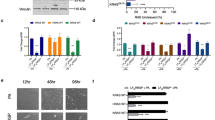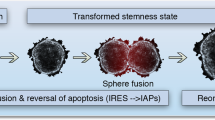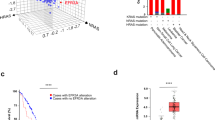Abstract
Ras oncogene activation is a key genetic event in several types of human cancer, making its signal pathways an ideal target for novel therapies. We previously showed that expression of mutant ras sensitizes human thyroid epithelial cells to induction of cell death by treatment with phorbol 12-myristate 13-acetate (PMA) and other phorbol esters. We have now investigated further the nature and mechanism of this cell death using both primary and cell line models. The cytotoxic effect of PMA could be blocked by bisindolylmaleimide (GF 109203X), a well-characterized inhibitor of c and n protein kinase C (PKC) isoforms, and by prior down-regulation of PKC, indicating that it is mediated by acute stimulation, rather than down-regulation. Western analysis identified two candidate isoforms--alpha and epsilon--both of which showed PMA-induced subcellular translocation, either or both of which may be necessary for PMA-induced cell death. Immunofluorescence showed that PMA induced a rapid nuclear translocation of p42 MAP kinase of similar magnitude in the presence or absence of mutant ras expression. Cell death exhibited the microscopic features (chromatin condensation, TdT labelling) and DNA fragmentation typical of apoptosis but after a surprising lag (4 days). Taken together with recent models of ras-modulated apoptosis, our data suggest that activation of the MAPK pathway by PMA tips the balance of pro- and anti-apoptotic signals generated by ras in favour of apoptosis. The high frequency of ras mutations in some cancers, such as cancer of the pancreas, which are refractory to conventional chemotherapy, together with the potential for stimulating PKC by cell-permeant pharmacological agents, makes this an attractive therapeutic approach.
This is a preview of subscription content, access via your institution
Access options
Subscribe to this journal
Receive 24 print issues and online access
$259.00 per year
only $10.79 per issue
Buy this article
- Purchase on Springer Link
- Instant access to full article PDF
Prices may be subject to local taxes which are calculated during checkout
Similar content being viewed by others
Author information
Authors and Affiliations
Rights and permissions
About this article
Cite this article
Hall-Jackson, C., Jones, T., Eccles, N. et al. Induction of cell death by stimulation of protein kinase C in human epithelial cells expressing a mutant ras oncogene: a potential therapeutic target. Br J Cancer 78, 641–651 (1998). https://doi.org/10.1038/bjc.1998.554
Issue Date:
DOI: https://doi.org/10.1038/bjc.1998.554
This article is cited by
-
PKCμ prevents CD95-mediated apoptosis and enhances proliferation in pancreatic tumour cells
Oncogene (2003)
-
PKC δ mediates ionizing radiation-induced activation of c-Jun NH2-terminal kinase through MKK7 in human thyroid cells
Oncogene (2001)
-
Cell death beyond apoptosis
Leukemia (2000)
-
PI-3-kinase is an essential anti-apoptotic effector in the proliferative response of primary human epithelial cells to mutant RAS
Oncogene (2000)
-
Activation of PKC is sufficient to induce an apoptotic program in salivary gland acinar cells
Cell Death & Differentiation (2000)



